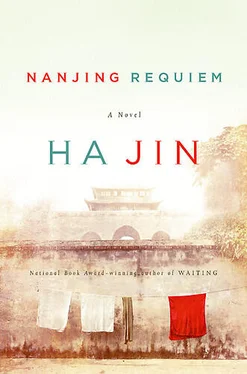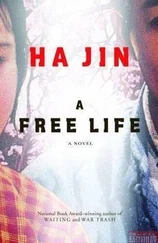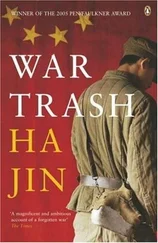“But there’re fourteen-year-olds who are almost grown. We have to save room for girls and young women. In your son’s case, you should say he’s thirteen.”
That brought out peals of laughter.
“When can we come?” the same woman asked.
“When it’s no longer safe to stay home. Bring only your bedding, a change of clothes, and some money. No chests or boxes, please.”
At the meeting’s end, Miss Lou, the zealous little woman, read Psalm 70 loudly. She cried out the refrain in a shrill voice: “Make haste to help me, O God.” Then we all stood up and sang the chorus from the hymn “Rock of Ages, Cleft for Me.” I’d bet that only a few of the attendees knew the words by heart; nevertheless, we all sang with abandon, some holding large hymnals with both hands, and our voices were earnest and strong.
THAT EVENING we received the first group of refugees. Most of them had come from the countryside, and some had trekked all the way from Wuxi, a city more than a hundred miles to the east. The Japanese had not only plundered their villages and towns but also seized young men and women, so people had abandoned their homes and fled to Nanjing, or had tried to cross the Yangtze to reach Pukou, unaware that the Japanese had just captured that area outside Nanjing to cut the retreat route of the Chinese army. The Japanese torched most houses along the way, destroyed whatever they couldn’t use, and had felled thickets and forests within a quarter mile of the railroads to prevent their supply trains from being ambushed. To defend the capital, the Chinese army was also razing civilian homes, especially in the Jurong area; it ordered people to leave their villages and then burned their houses to clear all possible obstructions to its cannons. This created more refugees, and now crowds of them swarmed at the city gates, waiting to be let in.
A woman with salt-and-pepper hair collapsed in front of us, sitting on a boulder and weeping while relating her story. “My daughter and I came to town to sell taros,” she sobbed, “but there was such a big crowd gathering outside Guanghua Gate that I lost her. I thought she’d get through the gate anyway and we could meet inside the city wall, but after I came in, the gate was suddenly closed ’cause the Japs began shelling that area. I waited inside the wall for the whole afternoon and couldn’t go out to look for her. Our home’s already gone, and she wouldn’t know where to go. Oh, my poor child, she’s just eleven.”
Some families came intact, but the men had to go elsewhere to find shelter for themselves. Most of them were willing to do so, grateful that their wives and children were in safe hands. A sleepy-eyed man went up to Minnie and implored her to give his family a little food because they had no money. She told him, “Don’t worry. We won’t let them starve.”
Word had it that the camps that accepted men as well were filling rapidly. We had not expected to receive refugees so soon, and now, on the evening of December 8, more than a hundred were already here. Minnie told ruddy-faced Luhai to set up a soup kitchen that would open the next morning.
IT WAS EERILY QUIET the next morning, and for hours few gunshots were heard. The cannonade in the east, south, and west had ceased too. We couldn’t help but wonder if the Japanese had entered Nanjing. That seemed unlikely, since the Chinese troops were still holding their positions. As Minnie and I were discussing the influx of refugees, Old Liao, our gardener, came and handed Minnie a leaflet. He was her longtime friend. Minnie had hired him from Hefei eighteen years ago when she came to Jinling to become its acting president — in place of Mrs. Dennison, who had gone back to the States for fund-raising for a year — because she wanted to create a beautiful campus. “I found this on the west hill this morning,” Liao said in a husky voice, pointing at the sheet, and smiled as if it were just a regular day for him. “There’re lots of them in the bushes. A Japanese plane must’ve dropped them. I don’t know what it’s about but thought you might want to take a look.”
Minnie skimmed it, then handed it to me. The leaflet bore words from General Matsui, the commander in chief of the Japanese Central China Expeditionary Forces. He demanded that the Chinese side capitulate without delay, declaring, “This is the best way to protect the innocent civilians and the cultural relics in the ancient capital.” So we must all lay down our weapons and open the city gates to welcome the Imperial Army. The decree continued: “It is our policy to deal harshly with those who resist and to be kind and generous to noncombatants and the Chinese soldiers who entertain no hostility to our invincible force. Therefore, I order you to surrender within twenty-four hours, by 6:00 p.m., December 9. Otherwise, all the horrors of war will be unleashed on you mercilessly.”
There were fewer than ten hours left before the zero hour. Minnie told Liao, “This is an order from Iwane Matsui, the top Japanese general.”
“Never heard of him. What’s he want?”
“He demands that the Chinese surrender the city to him. What do you think we should do?”
“Well”—Old Liao scratched the back of his round head—“I don’t know. I hope he’ll leave people in peace.”
His answer seemed to amuse Minnie. Unlike the other staffers, Old Liao was untroubled by the coming of the Japanese, though his daughter had left with his grandchildren. We knew he was a timid man, and all he cared about was growing flowers and vegetables. War was simply beyond his ken. Yet Minnie had deep affection for this old gardener, who had a marvelous green thumb — whatever he touched would turn pretty and luxuriant in due time. As he slouched away trailing the grassy smell that always clung to him, I turned his answer over in my head. Maybe he was right to a degree — the common people would have to live, so whoever the ruler was, insofar as he did not interrupt their livelihood, they could accept him. But I stifled this thought, because all the recent Japanese atrocities spoke against such a possibility.
The leaflet from General Matsui might explain the quiet of this morning — the invading force must have been waiting for our side to respond to the ultimatum. I told Minnie this, and she agreed. Lewis Smythe confirmed our hunch when he came later that morning to inspect our medical clinic. Our telephone was already out of service, so he had to come in person. Lewis was surprised that Jinling had so far admitted only three hundred refugees, but he praised our careful planning and also told us that the four Britons and the Danish man on the Safety Zone Committee had just left Nanjing. We shouldn’t worry, though, he assured us, because more people, especially the locals, had begun participating in the relief work.
Lewis was a sociologist from Chicago teaching at Nanjing University and was also a missionary. He was rather sensitive and frail but always spoke eloquently. Even when conversing with people, he’d speak as if he were giving a lecture, with his hand gesticulating vividly. These days Lewis seemed quite spirited, as if the impending siege had charged him with vim and vigor; he even confessed to Minnie that he enjoyed “all the activities.” I guess he had never found his life so active and purposeful — above all, so intense.
Minnie invited him to a late lunch in the main dormitory, and I joined them. The food was plain: rice, sautéed mustard greens, and salted mackerel. Lewis, like Minnie, was one of the few foreigners who liked Chinese food. This was an advantage, since all stores had disappeared in town and foreign groceries were impossible to come by; what’s more, it was believed that eating the local food every day could build up one’s immunity to diseases, such as dysentery and malaria. Lewis told us that his effort to organize the ambulance service had collapsed, because the military commandeered automobiles at will. At the moment, he had only two vans that ran. As the secretary of the Safety Zone Committee, he was swamped with work, running around to make sure that basic medical services would be available in every camp.
Читать дальше











